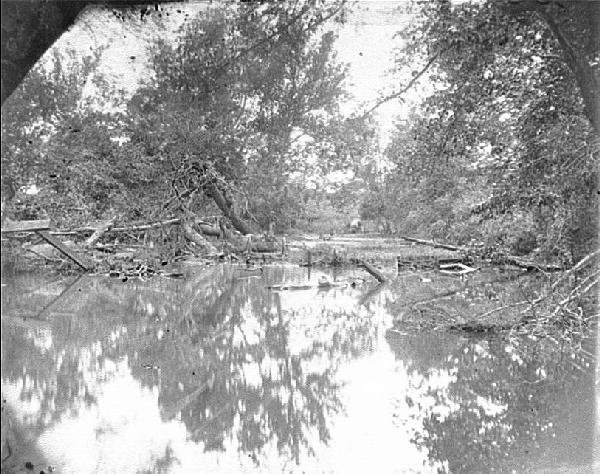Deguello
Outside, Santa Anna's troops played Deguello ("slit throat") a bugle call the Spanish heard and learned from the Moors. It meant that no quarter would be given-- no prisoners. The bugle call was intended to bring about a sense of hopelessness, to weaken the fight left in the defenders with the despair of certain defeat--certain death.
When I was young, hearing the Nitty Gritty Dirt Band's Circle album, the song Soldier's Joy became one of my all time favorite songs. It resonated deeply within me, and I often wondered what it was about that song. Also unknown to me at the time was that my great-great-grandfather, his brother, and their father were three of those Rangers hastening to help the Alamo defenders.
On the radio, "my music" was rock & roll, and Texas country ( e.g., Jerry Jeff Walker, Willie Nelson, Michael Murphy, Ray Wiley Hubbard, and such). These were the songs of my culture, of my time, and I always loved good music-- especially music with good lyrics. But two aberrant types of music touched me deeply-- Appalachian and bagpipes.
Odd that it would not be until my mid-forties that I would learn of my Texas Ranger (and Scotch) ancestors and the link of Soldier's Joy to the Alamo-- not until I needed to know, perhaps?
You see, after the Mexican's taunted the Texans with their serenade, the Texans began playing the instruments which they had with them. They played several tunes, but the first, it is said, was "Soldier's Joy." They played the music for themselves. It was a response only in that the music was closer to a celebration-- the antidote to despair.
Soldier's Joy
I am working on a novel, but taking timeout to do some unrelated study, combined with prayer after taking stock. The novel was inspired by a Mission City vision dream. The vision dream took place far south and east of Mission City. Two brothers, with 19th Century long rifles, covered in mud in a driving rain, trying hard to escape two or three enemy units trying to flank them. Shots are fired, but the two brothers are outnumbered, one is wounded, and staying together, as the unwounded one would prefer, would be tactically fatal.
I seem to be observing, unseen, not participating.
The two peal off from the cover of trees from one tree to the next, in retreat, leap-frogging the other as they try to outrun and out shoot their pursuers. Ultimately, the unwounded brother pulls his fallen sibling behind him to a rushing creek. Over the edge, into the root bound soil which the rushing water had not yet been able to erode away. The unwounded brother pulls a bowie knife and waits to be found, determined to do as much damage as he can before being bayoneted (or shot) when found.

He was not found. Perhaps the soldier closest to them did see them, but pretended not to. The war was over anyway, let it go and stay alive.
I did not know it at the time, but the vision dream led me to find relatives who had fought in a war. I knew I had a great-great-great grandfather who had been a Army Chaplain in the Civil war, stationed in Virginia; but, carrying a weapon, I doubted he was one of the brothers. But something told me that the vision dream was important to me, and regarded my family. Having a brother, I worried very much about a possible interpretation of losing him in some trauma (and he would certainly joke that I would have to be the one who was wounded and died in the rain!).
Then I find that my grandmother's grandfather, J.L. Gray, his brother, Joshua, and their father, Daniel, had all served together as spies (we now call them "scouts"), mounted riflemen (read, "snipers with horses") in the first Texas Ranger Corps. Joseph died in service, after the battle of San Jacinto. It is believed that the three men were trailing the defeated and retreating Mexicans back toward the Rio Grande. I do not know, and never will in this life, if the vision dream was historically accurate; but I found courage in my own defeat to carry on because of the vision dream and the connection I would soon learn with my own family.
At some point, I wrote, "As with all godly missions, one does not fight to win, one wins by fighting."
Soldier's Joy makes perfect sense to me.
When it comes on my iPod, as when I hear bagpipes, I have to concentrate hard or else I will give away what is resonating within me-- something private and hard to explain-- I have to concentrate on merely walking, because otherwise, I would march.
I have lost. I cannot win the battle which must be waged. I wasn't asked to win, I was asked to fight. I wonder if, just maybe, that is what Mission City is for.
No comments:
Post a Comment